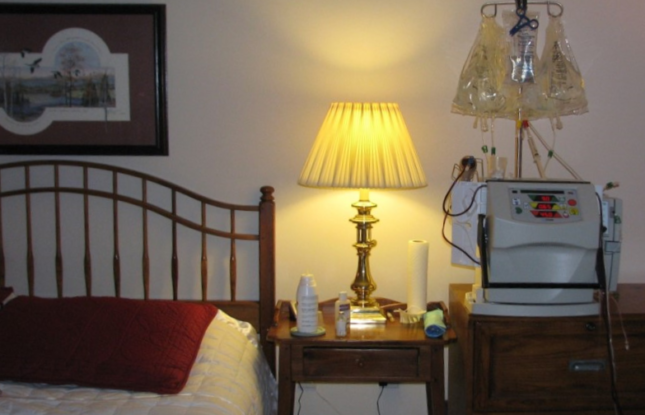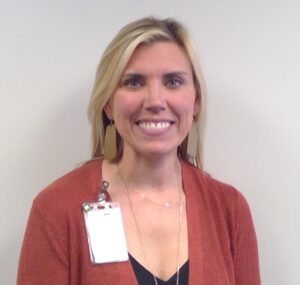
Dr. Anubha Mutneja, new Medical Director of Home Modalities
Of the more than 726,000 Americans suffering from end-stage renal disease (ESRD), only 10% are currently on home dialysis (peritoneal dialysis and home hemodialysis). Dr. Anubha Mutneja, Assistant Professor in the Division of Nephrology and Medical Director of the Home Modalities Program at Washington University, plans to change that.
“We hope to expand home dialysis such that it is easily accessible to each and every patient in need of dialysis,” says Dr. Mutneja.
With newer, more user-friendly dialysis technologies and changes in government reimbursement policies, choosing home dialysis is becoming more attractive … and feasible … for the 100,000 patients who begin dialysis each year to treat ESRD.
Dr. Mutneja developed an interest in home dialysis when she was a fellow in our division from 2013 – 2015. After graduating the fellowship, she joined a private nephrology group associated with Iowa Methodist Medical Center in Des Moines, Iowa, and has been expanding their home modalities program for the past four years. Dr. Mutneja returned to St. Louis to take over the WU Home Modalities Program on July 1, 2019.
Offered as an alternative to in-center dialysis, home dialysis gives patients a higher degree of flexibility and control over their lives, due to the convenience of being able to have treatments performed in the comfort of one’s home. In addition, studies have shown that home hemodialysis and peritoneal dialysis have better clinical outcomes and lower hospitalization and infection rates compared to in-center dialysis.

Home hemodialysis machines are small enough to fit on a bedside table
Other perks include fewer dietary restrictions and better control of blood pressure and phosphorous, which may result in patients requiring fewer medications. Patients report increased energy, improved appetite and better sleep. Home dialysis is considered to be gentler on the body and there are fewer “rules” (for example, patients can have visitors and eat during dialysis).
The WU Home Modalities Program currently has approximately 120 patients on home dialysis.
“We take pride in being one of the largest academic home dialysis programs,” says Dr. Mutneja. “Informing and educating patients about the option for home dialysis modalities is our top priority. Educating our patients helps them make informed decisions regarding different treatment options.” Currently, one out of every five patients requiring hemodialysis here selects the home option.

Shawna McMichael, Nurse Manager of the Home Modalities Program
A dedicated multidisciplinary team of experienced physicians, highly skilled nurse coordinators, medical staff, social worker and dietition are available to assist patients who choose this option. Shawna McMichael, Nurse Manager of the Home Modalities Program, says, “Having a well-rounded and respected team is essential to offering patients the standard of care that has helped our home program achieve continued growth and success.”
The program has a comprehensive home modality educational curriculum for our nephrology fellows, with specific learning objectives to complement their clinical training. In addition to a monthly home dialysis clinic, fellows have the opportunity to participate in home modality clinics as part of their electives for in-depth learning.
“Our nephrology fellows see a high volume of peritoneal and home hemodialysis patients and gain tremendous experience in the day-to-day management of home dialysis patients,” says Dr. Mutneja.
An Executive Order on Advancing American Kidney Health that was signed in Washington DC July 10, 2019, which aims at improving access to and quality of patient-centered treatment options for patients on dialysis. This will help promote greater use of home dialysis modalities along with kidney transplant. The order will evaluate the effects of creating payment incentives for greater use of home dialysis and kidney transplants for Medicare beneficiaries on dialysis. Generating greater rates of home dialysis and transplantation will improve the quality of life and care for patients who require dialysis, and may eliminate the need for dialysis altogether for many patients.
“With new changes being proposed, it is expected that home dialysis practices will grow considerably throughout the country,” says Dr. Mutneja. “Our program ensures that our graduating fellows are highly trained in this field and will be fully prepared to take on any challenges in practice.
“WU is not only a great place to train, but also a perfect environment in which to actually make a difference. We have a great home dialysis program and I want it to reach new heights.”
Follow Dr. Muneja on Twitter @AnubhaMutneja.
Find out more about our Home Modality Program here, and watch the 2019 ASN TV video highlighting our Home Modalities Program below.